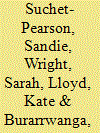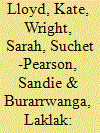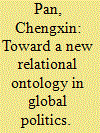|
|
|
Sort Order |
|
|
|
Items / Page
|
|
|
|
|
|
|
| Srl | Item |
| 1 |
ID:
123498


|
|
|
|
|
| Publication |
2013.
|
| Summary/Abstract |
This collaboratively written paper takes the reader on a journey to Bawaka, in North East Arnhem Land, northern Australia, to explore how a Yol?u ontology of co-becoming can inform natural resource management (NRM) theory and practice. By focusing on the process of gathering and sharing miyapunu mapu (turtle eggs) and the foundational Yol?u concept of wetj, we challenge NRM to take seriously Indigenous ways of knowing and becoming, and to attend to the vibrant, more-than-human relationality of our world. We discuss this relational cosmology, highlighting the importance of being aware and attentive, as well as the underlying ethical imperative of responsibility and obligation. We argue that as important as the concept of Caring for Country has been for NRM in Australia, it is critical that the human imperative to care for Country is balanced with a multi-directional and beyond-human understanding of the human-Country relationship. This requires engagement with the ways Country also cares and acknowledgement that humans are part of Country and not separate from it. We therefore propose a reframing, that we not only Care for Country but Care as Country. This has implications for understanding the ways that humans can and should relate to the environment as they exist together through co-becoming.
|
|
|
|
|
|
|
|
|
|
|
|
|
|
|
|
| 2 |
ID:
123515


|
|
|
|
|
| Publication |
2012.
|
| Summary/Abstract |
This paper draws on the collaborative experiences of three female academics and three generations of Yol?u women from an Aboriginal family from Bawaka, North East Arnhem Land to contribute to debates in development around participation, power and justice. Through a reflection on the process of collaboratively co-authoring two books and associated outputs, the paper discusses the way the collaboration is guided by collective priorities that are held as paramount: trust, reciprocity, relationships and sharing goals. The paper draws particular attention to the essential role that families and non-human agents play in shaping these priorities. The relational ontology which underlies this collaboration is inspired by a Yol?u ontology of connection that requires us to acknowledge ourselves as connected to each other, to other people and to other things. Guided by this Indigenous ontological framework, we reframe the concept of collaboration and of development as inherently and always relational.
|
|
|
|
|
|
|
|
|
|
|
|
|
|
|
|
| 3 |
ID:
161571


|
|
|
|
|
| Summary/Abstract |
The theoretical challenges for international relations (IR) posed by China’s rise cannot be adequately addressed at a mere theoretical level. Predicated on a Cartesian/Newtonian ontology that assumes a mechanistic world made up of discrete, self-contained parts (e.g., sovereign nation-states), mainstream IR theories offer limited understanding of China’s rise. In this article, I propose an alternative, holographic relational ontology. Drawing upon recent IR scholarship on relational ontology and holographic ideas in quantum physics as well as traditional Asian thoughts, this ‘new’ ontology posits that the world exists fundamentally as holographic relations, in which a part is a microcosmic reflection of its larger whole(s). As a part of various wholes in global politics, ‘China’ is thus never an entity in and of itself, but holographic reflections of them. Its rise is best understood as a phenomenon of holographic transition, in which characteristics of those larger wholes are being enfolded into what is known as ‘China’. Thus, both the ‘China’ challenges and ‘China’ opportunities, rather than some inherently ‘Chinese’ properties, are products of China’s holographic relations. This ontology has broader conceptual and methodological as well as policy implications for IR in East Asia and beyond.
|
|
|
|
|
|
|
|
|
|
|
|
|
|
|
|
|
|
|
|
|